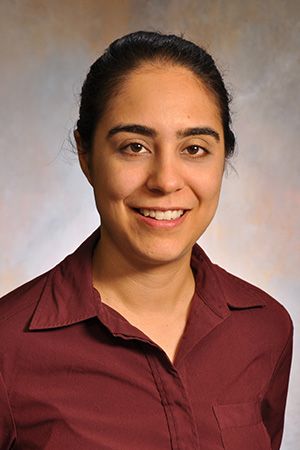Editor Spotlight: Dr. Marina Sharifi

Dr. Sharifi is a PGY-5 Medical Oncology fellow in the ABIM research pathway at the University of Wisconsin, Madison. She completed her MD as well as a PhD in cancer biology through the Medical Scientist Training Program at the University of Chicago Pritzker School of Medicine, followed by Internal Medicine residency at UW Madison. Her clinical interests include breast and thoracic oncology as well as melanoma, and her research focuses on the development and application of liquid biopsy technologies to delineate mechanisms of resistance to targeted therapies.
Dr. Marina Sharifi first thought about training to become a physician scientist during her undergraduate studies in molecular and cellular biology at UC Berkeley: "I discovered how much I loved being in the lab, and the satisfaction of getting an experiment to work after weeks of troubleshooting…but at the same time, it was hard for me to think about giving up the chance to care for patients on a day to day basis as a clinician.”
In many ways, the comprehensive approach that encompasses medical oncology is what drew Dr. Sharifi to the branch of medicine: "[oncology] is the epitome of taking care of the whole patient, from diagnosis to treatment; I feel honored to have the chance to witness and guide my patients as they cope with the challenges of living with cancer." As a med student and PhD candidate at the University of Chicago Pritzker School of Medicine, Dr. Sharifi experienced this first hand: "on my inpatient oncology rotation, I helped take care of a patient hospitalized with a new cancer diagnosis. Months later, I happened to run into her again; she instantly remembered me and told me how much our support during her hospitalization had meant to her. That moment stuck with me as a reminder of how important empathy and humility are in oncology—it’s not just about fighting cancer, it's about helping our patients have a good life with the diagnosis they have."
One of the hardest challenges Dr. Sharifi has had to face in the field is a timely reminder of unpredictability: "months ago if you asked me what the hardest thing I've had to deal with as a doctor, I'd have a different answer. But [COVID-19] tops them all. We don't have a lot of concrete data yet about hard decisions we have to make with our patients; they're especially vulnerable during this time and I wish we had more answers."
Dr. Sharifi's research projects motivate and inspire her to improve techniques and therapies in her focus: "I’m currently working on a project developing novel liquid biopsy technologies to evaluate phospho-proteins, and I’m hopeful that this may lead to the development of longitudinal biomarkers for targeted therapies in breast cancer. I'm hoping, overall, the next five to ten years will bring an improvement in how we tailor chemo- and targeted-therapies!"
Overall in medicine, Dr. Sharifi is thinking about the big questions that affect patient care and the direction oncology is headed in over the next few years. She remarks, "many new drugs are being approved on surrogate endpoints and it is important to continue to pay attention to what constitutes an effective drug from a patient and cost standpoint, and how to best incorporate that into trial design." One way of advancing care that Dr. Sharifi is glad to be a part of is theMednet! "There are a lot of interesting discussions happening on theMednet that highlight areas of clinical uncertainty, and it's helpful to see what different practices are doing in these scenarios," she says.
Outside of work, Dr Sharifi enjoys baking, playing the violin, and helping her wife take care of their two cats: "we thought our first cat was lonely so decided to get another cat to keep him company, only to find out he hates other cats, so they have to be kept apart at all times!"
